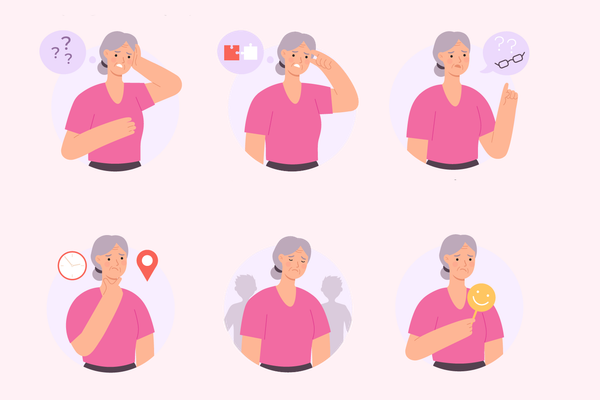Being a caregiver is challenging under the best of circumstances, but caring for someone with Alzheimer's disease presents its own unique set of concerns and problems.
Alzheimer's disease destroys brain cells, beginning slowly and getting worse over time. Because it affects the person's ability to think clearly, remember things and use good judgment, it can have a devastating impact on their behavior and make it difficult for a caregiver to understand and manage them.
Everyday things like driving a car, cooking a meal or paying bills becomes difficult if not impossible for a person with Alzheimer's. They may get lost, misplace things and have trouble following directions. A person with Alzheimer's loses their grip on reality and may experience hallucinations, delusions and paranoia. Their eventual loss of independence can lead to feelings of frustration, anger, anxiety or even violence.
Learn more about 7 Early Signs of Alzheimer's.
As a caregiver, it's normal to experience a mixed bag of feelings. You may feel good about caring for a person who needs you, yet at other times, you may feel overwhelmed and even angry at the circumstances and the amount and breadth of the ensuing responsibilities that come with caring for someone whose changes you may have difficulty understanding and coping with. Watching someone you love decline over time and losing the ability to manage daily living can be arduous and difficult.
Caring for someone with Alzheimer's takes not only dedication, but patience and flexibility as well. Since the disease's progression is unpredictable and varies for each person, your caregiving responsibilities may change from day to day. You need to be prepared for the unexpected and be and realistic with your expectations, as well.
Here are some tips to help you care for someone with Alzheimer's:
- Promote a safe environment. Reduce the likelihood of falls by removing scatter rugs, extension cords and clutter. Install handrails and grab bars where necessary, and use nightlights in the hallway, bathroom and bedroom. People with Alzheimer's may rummage through cabinets, drawers and closets or may hide things around the house. Install locks on cabinets that have dangerous substances like medicine, alcohol, toxic cleansers and tools or utensils. Lower the water temperature on the hot water heater to prevent burns or scalding. Be aware of fire hazards. Matches and lighters should be placed out of reach. Don't allow smoking without supervision, make sure smoke alarms are working and keep a fire extinguisher within reach.
- Work to reduce frustrations. Be thoughtful with scheduling. There will be times when the person is more energetic, alert and willing, so try to schedule tasks like hygiene or medical appointments accordingly. Some times of the day are more difficult for people with Alzheimer's, like late afternoon and evening. They may experience feelings of confusion, agitation or restlessness around the end of the day, known as "sundowning." Make sure they get enough exercise each day. This can help reduce the restlessness and agitation that are part of the disease.
- Allow them to help. People with Alzheimer's may still be capable of carrying out some tasks with little or no assistance, like setting the table or folding laundry. Some may also be able to dress themselves if you lay out the clothing ahead of time.
- Communicate clearly and simply. Use succinct, simple instructions. Be patient when they struggle to find words or forget what they wanted to say, and try not to react or argue if they blame you for something. If they are experiencing paranoia or hallucinations, try to comfort them, rather than talk them out of it.
- Slow the pace. Allow for the fact that things will take longer than usual; leave plenty of time so that the person doesn't feel rushed or stressed.
- Minimize distractions. Mealtimes and conversations without outside noise of the television or radio can help the person focus more clearly and can prevent them from viewing or hearing something that might be potentially upsetting to them.
It's easy to understand how caregivers can experience burnout—a state of feeling physically, emotionally and mentally drained and plain out exhausted. That's why, as a caregiver, it's so important to take care of yourself by seeking help from friends, family and support groups, taking short breaks, eating healthfully and getting exercise.
Here are some helpful resources:
Alzheimer's Association: 800-272-3900 or info@alz.org www.alz.org
Alzheimer's Foundation of America: 866-232-8484 or info@alzfdn.org www.alzfdn.org
Eldercare Locator: 800-677-1116 or www.eldercare.gov
Alzheimer's and Related Dementias Education and Referral (ADEAR) Center: 800-438-4380 or adear@nia.nih.gov www.alzheimers.gov







